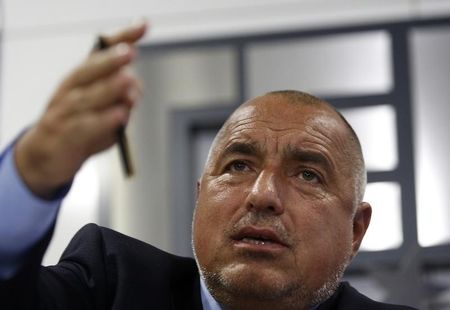By Tsvetelia Tsolova and Angel Krasimirov
SOFIA (Reuters) - The winner of this month's general election said on Monday he was willing to try to form a government, but warned that Bulgaria might have to return to the polls next year as parties struggle to agree on a coalition.
The centre-right GERB party emerged as the largest single parliamentary force at the Oct. 5 vote, but fell dozens of seats short of a majority in the most fractured result the Balkan state has seen since the fall of Communism in 1989.
The newly elected parliament met for the first time on Monday, and GERB leader Boiko Borisov told lawmakers there were three options to break the political deadlock.
One was for a short-term technocrat-led government that would be in charge until new elections were held in July, to coincide with municipal polls. A second possibility was to form a government with a two-year shelf life, while the third option was to put together a team to survive a full four-year mandate.
"I am open to any option provided that it guarantees stability," said Borisov, calling for a meeting with parties on Tuesday to discuss the options.
The European Union's poorest country, Bulgaria has been dogged by instability for the past two years that has turned off voters and investors alike.
The political squabbles have hampered efforts to solve a banking crisis that has left the fate of Corporate Commercial Bank (Corpbank), the country's fourth-largest lender, in limbo after a run on deposits in June.
CORPBANK UNCERTAINTY
Criticised by lawmakers for its handling of Corpbank, the central bank submitted a report to parliament on Monday, recommending the creation of a parliamentary commission to decide whether to rescue the bank or let it collapse.
It also said the central bank would likely be obliged to revoke Corpbank's licence in November unless parliament agreed to introduce legal changes to allow the lender to be rescued.
A small group of Corpbank's depositors, who have not been able to withdraw money since June, staged a protest outside the parliament building.
The central bank said last week an international audit had determined that Corpbank needed to write off 4.2 billion levs (2.1 billion pounds) on total assets of 6.7 billion levs, adding that only 13 percent of its loans were properly backed by collateral.
GERB has been trying to set up a coalition with a small, right-wing party grouping known as the Reformist Bloc, which opposes any state bailout of Corpbank.
Borisov and his main Socialist opponents have called on the central bank governor to resign over the scandal. The governor himself offered to do so prior to the election.

A central bank spokesman told Reuters that the offer still stood, but said "the issue of the resignation of the governor is a personal one and can become a topic for discussion once Corpbank's case is solved and people get their money."
(Editing by Matthias Williams and Crispian Balmer)
